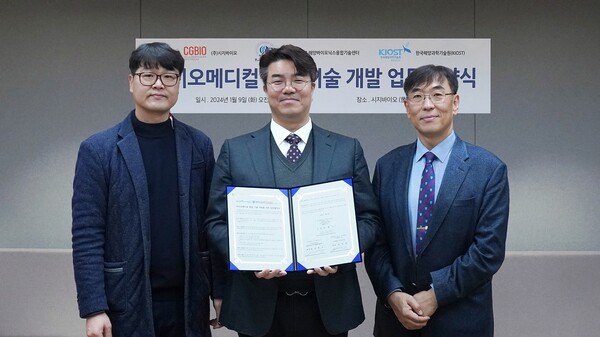CG Bio, a regenerative medicine company, said Thursday that it has signed a business agreement with the Research Center for Marine-integrated Biomedical Technology (MiBC) at Pukyong National University (PKNU) and the Korea Institute of Ocean Science & Technology (KIOST) to develop medical ingredients and products using fishery by-products.

Under the terms of the agreement, PKNU and KIOST will develop basic and applied technologies to utilize marine by-products as medical ingredients and products, providing laboratory and research infrastructure. CG Bio will be responsible for the entire process of product production and commercialization based on the technologies developed in cooperation.
Fishery by-products, including bones, fins, guts, and shells, are incidental to the primary product during the capture, harvesting, farming, and processing of fish. They represent a natural resource and one of the raw materials with a sustainable supply.
Despite this, fishery by-products are often discarded due to legal restrictions, demanding the need for industry and academia to find ways to utilize them.
The three organizations will utilize marine fishery resources to develop medical materials and products with enhanced safety and the ability to promote tissue regeneration and wound healing compared to existing materials, CG Bio said.
In particular, through industry-academia-government cooperation, CG Bio can leverage the capabilities of universities and research institutes to develop innovative technologies, products, and new business models, while universities and research institutes have the advantage of accumulating specialized knowledge and skills in their fields.
Furthermore, the development of innovative technologies and products is expected to contribute to the regional and national economies by promoting economic growth and enhancing competitiveness in industrial sectors.
KIOST is a comprehensive marine research institute and has been leading the development of marine science and technology for 45 years since its establishment in October 1973 by continuously expanding the research infrastructure required for marine research.
the Research Center for MiBC is an institution with high expertise in convergence technology, developing various medical products and source technologies by combining marine-derived materials with next-generation biotechnology.
"Although marine by-products have been proven to promote tissue regeneration and wound healing through basic research around the world, the commercialization process, including various regulations, technology development, and facility construction, has been difficult for many companies to challenge," said Yu Hyun-seung, CEO of CG Bio. "We will strive to develop competitive products through cooperation between industry and academia to supply products with better effects to patients."

